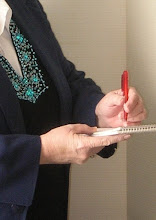Was reading Bob Ewing’s report on Breitbart presents Big Government entitled, “THIS IS IT: Will Florida Republicans Fight for Economic Freedom Tomorrow?
His article questioned “whether Republican Senators will live up to their promises to remove job-killing regulations.....or cave in to power special interests and high-paid lobbyists?”
Today, the Senate votes on HB 5005 which removes needless licensing for hair braiders, theater workers and interior designers.
His article goes on to talk about how The American Society of Interior Designers (ASID) represents less than three percent of all designers yet through their economic and political power have lobbied states to endorse them alone as the only one who should set the rules for the entire industry. Rules like one needs a college degree to match the drapes to the sofa.
Sounds familiar, doesn’t it. A society, association or guild, with money and with leaders who lack character and decency and want to stifle competition, can turn into a bunch of union thugs expecting tribute for the right to work in their industry.
At the end of Bob Ewing’s report is a link to the Institute for Justice. The Institute site lists the Republican Senators who will be voting on this issue. I’ve emailed them all asking them to support HB 5005. Just put: Support HB 5005 in the subject line. That’s about all they can take the time to read at this point.
If you’ve read my previous posts, you know I don’t like this last minute emailing or calling, because legislative aides who receive the emails or answer the phones have no way to verify whether or not the person sending the email or calling is even a Florida resident. All the more reason for Floridians to make their voices known now.
Bob Ewing’s report:
http://biggovernment.com/bewing/2011/05/05/this-is-it-will-florida-republicans-fight-for-economic-freedom-tomorrow/
Institute of Justice
http://ij.org/about/3745
Friday, May 6, 2011
Tuesday, April 5, 2011
SOPL founder asks his NY State representative to read The Locksmith Investigator
Tom Lynch, the founder of the Society of Professional Locksmiths, copied me on an email he had sent to his state representative, Assemblywoman Ellen Jaffee, recommending she read my investigative report, Accurate Answers?, as well as the summary of the report detailed in my February 7 posting.
Locksmiths in NY are currently fighting more regulation purported to combat criminals posing as locksmiths. However, more regulation of law-abiding locksmiths does not stop criminal activity. Only by enforcing existing fraud laws can criminal activity be lessened. Following is Lynch’s email.
DO NOT PASS Locksmith Licensing Act 2011 A985
Dear Assemblywoman Jaffee,
Please take a moment to review an investigation conducted by award winning investigative news journalist Barbara Haiss Martin of "The Locksmith Investigator" news blog of Altamonte Springs, FL.
Summary: An investigation was conducted regarding the call for licensing locksmiths within the state of Florida and the claims being made for the justification. The claims turned out to be falsely presented to lawmakers in order to present an urgent need for regulation. Florida ultimately did not pass the bill as a result.
The same misleading activity is being conducted here in New York and elsewhere by individuals who represent a minority within the global community of locksmiths who do not speak for the entire industry. These same individuals have an "ends" agenda centered more around financial gain in the form of forced proprietary education programs, restriction of trade, elimination of competition and the smaller Mom & Pops operations, then it does consumer safety or protection.
The attempts to create hysteria by using the issue of criminals "posing" as locksmiths to force regulation upon the hardworking Mom & Pops is unjustified. New York State,as in Florida and elsewhere lack the sufficient data to support the claims being presented and it would be an unfair penalty against the Mom & Pops who have conducted themselves ethically.
The ancillary costs associated with the passage of such a regulation which is not being considered will cause great harm to an industry which has conducted itself honorably. Existing laws are in place for New York to address criminals abusing the public trust and should be enforced.
Reference: The Locksmith Investigator
Articles - April 6th through February 7th 2011
Please note both the May 24th & particularly the 25th where I am quoted as to "The Fabric of the (Locksmith) Industry"
http://locksmithinvestigator.blogspot.com/
cc: NYS Assembly
--
Tom Lynch, CRL
Director of Operations
P.O. Box 87
Sparkill, N.Y. 10976
845-445-8238
www.sopl.us
www.securitytechnicalinstitute.com
Locksmiths in NY are currently fighting more regulation purported to combat criminals posing as locksmiths. However, more regulation of law-abiding locksmiths does not stop criminal activity. Only by enforcing existing fraud laws can criminal activity be lessened. Following is Lynch’s email.
DO NOT PASS Locksmith Licensing Act 2011 A985
Dear Assemblywoman Jaffee,
Please take a moment to review an investigation conducted by award winning investigative news journalist Barbara Haiss Martin of "The Locksmith Investigator" news blog of Altamonte Springs, FL.
Summary: An investigation was conducted regarding the call for licensing locksmiths within the state of Florida and the claims being made for the justification. The claims turned out to be falsely presented to lawmakers in order to present an urgent need for regulation. Florida ultimately did not pass the bill as a result.
The same misleading activity is being conducted here in New York and elsewhere by individuals who represent a minority within the global community of locksmiths who do not speak for the entire industry. These same individuals have an "ends" agenda centered more around financial gain in the form of forced proprietary education programs, restriction of trade, elimination of competition and the smaller Mom & Pops operations, then it does consumer safety or protection.
The attempts to create hysteria by using the issue of criminals "posing" as locksmiths to force regulation upon the hardworking Mom & Pops is unjustified. New York State,as in Florida and elsewhere lack the sufficient data to support the claims being presented and it would be an unfair penalty against the Mom & Pops who have conducted themselves ethically.
The ancillary costs associated with the passage of such a regulation which is not being considered will cause great harm to an industry which has conducted itself honorably. Existing laws are in place for New York to address criminals abusing the public trust and should be enforced.
Reference: The Locksmith Investigator
Articles - April 6th through February 7th 2011
Please note both the May 24th & particularly the 25th where I am quoted as to "The Fabric of the (Locksmith) Industry"
http://locksmithinvestigator.blogspot.com/
cc: NYS Assembly
--
Tom Lynch, CRL
Director of Operations
P.O. Box 87
Sparkill, N.Y. 10976
845-445-8238
www.sopl.us
www.securitytechnicalinstitute.com
Monday, February 7, 2011
Wall Street Journal reporter looks at how regulations effect job growth
Reporter Stephanie Simon with the Wall Street Journal has written an excellent article entitled "A License to Shampoo: Jobs Needing State Approval Rise" about regulation of occupations and the reasoning or lack of reasoning behind it. It's a fascinating look at what is happening around the country and is worth the read. Click on the name of the article to link to the story.
I did post the following comment on the site:
Excellent, well-research, well-balanced, well-written article. I especially liked how Stephanie Simon exposed how many actual complaints there were in an industry that proponents of regulation would have had to lie about or fail to mention to get their regulation passed. Last May, I wrote 3-part investigative report for my blog on how a national locksmith association working with one small local locksmith association attempted (and failed) to get a locksmith law passed in Florida. The point man for the local association was none other than the former president of the national association, a fact he failed to mention to lawmakers. The group exaggerated their importance and influence in the locksmith industry, over-stated the scammer problem in Florida by giving legislators a booklet of 200 “locksmith misconduct” news articles without mentioning that only 4 actual stories were from Florida and none about professional locksmiths, besmirched the character of hard-working locksmiths by not distinguishing between the professional locksmiths and the call-center owners who were dispatching scammer “locksmiths” and they did not mention what practically eliminated the scammer problem before the legislative session began. Attorney Generals around the country began using existing consumer protection laws to arrest the call-center owners. One AG reached into Florida and snatched out one of the largest owners in the country, David Peer, effectively shutting down a nationwide operation. Peer is still sitting in a jail in Missouri. So what was behind this whole locksmith legislation push (besides stifling competition), not only in Florida, but also in other states? While on one hand proponents kept screaming “consumer safety” attempting to get lawmakers to pass the bill “to protect the public,” what the other hand had done was write the legislation to include expensive and unnecessary initial and continuing education and training that, oops! the national association just happened to sell. Fortunately, we now have an anti-regulation Governor in Florida. To read the full investigative report, Google the words “Locksmith Investigator” and look for the series “Accurate Answers?” starting on May 24, 2010. Again, kudos to Stephanie Simon for a balanced and in-depth article that looked at occupational regulations and the reasoning (or lack of reasoning) behind it.
I did post the following comment on the site:
Excellent, well-research, well-balanced, well-written article. I especially liked how Stephanie Simon exposed how many actual complaints there were in an industry that proponents of regulation would have had to lie about or fail to mention to get their regulation passed. Last May, I wrote 3-part investigative report for my blog on how a national locksmith association working with one small local locksmith association attempted (and failed) to get a locksmith law passed in Florida. The point man for the local association was none other than the former president of the national association, a fact he failed to mention to lawmakers. The group exaggerated their importance and influence in the locksmith industry, over-stated the scammer problem in Florida by giving legislators a booklet of 200 “locksmith misconduct” news articles without mentioning that only 4 actual stories were from Florida and none about professional locksmiths, besmirched the character of hard-working locksmiths by not distinguishing between the professional locksmiths and the call-center owners who were dispatching scammer “locksmiths” and they did not mention what practically eliminated the scammer problem before the legislative session began. Attorney Generals around the country began using existing consumer protection laws to arrest the call-center owners. One AG reached into Florida and snatched out one of the largest owners in the country, David Peer, effectively shutting down a nationwide operation. Peer is still sitting in a jail in Missouri. So what was behind this whole locksmith legislation push (besides stifling competition), not only in Florida, but also in other states? While on one hand proponents kept screaming “consumer safety” attempting to get lawmakers to pass the bill “to protect the public,” what the other hand had done was write the legislation to include expensive and unnecessary initial and continuing education and training that, oops! the national association just happened to sell. Fortunately, we now have an anti-regulation Governor in Florida. To read the full investigative report, Google the words “Locksmith Investigator” and look for the series “Accurate Answers?” starting on May 24, 2010. Again, kudos to Stephanie Simon for a balanced and in-depth article that looked at occupational regulations and the reasoning (or lack of reasoning) behind it.
Subscribe to:
Comments (Atom)

